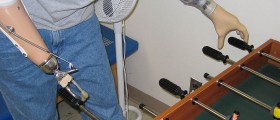
Amputation is a term used for a medical procedure which involves removing one's limb through the process of trauma, prolonged constriction or surgery. Amputation is usually taken into consideration once there are no other ways of stopping pain or controlling a disease affecting the limb. Therefore, gangrene, tumors and other such problems are usually dealt with through the removal of the affected limb.
However, amputation can have enormous impact on one's life in general, affecting many factors of a person's existence. People who have undergone amputation face a certain social stigma and numerous life problems. Therefore, this type of medical intervention is commonly considered to be the last resort.
Why Is Amputation Performed?
There are many cases which result in amputation. In fact, this procedure is one of the oldest types of surgeries known to people. However, amputation has been a part of the human culture for many other reasons too.
Namely, in the past, in some cultures, amputation of hands and feet was considered to be an act of punishment for committed crimes. Additionally, in warfare, amputation had the same effect and purpose. Ritual and religious reasons behind amputations were also present in our history. In fact, some cultures still tend to use amputation for many of these purposes.
Once a human limb has been removed, it can never grow back again. Therefore, amputation of any type is bound to lead to impairments. However, today, a person who has lost his/her limb this way can opt for prosthetic limbs which have undergone a great evolution, making it possible for the person using these to perform many tasks normally.
As far as medical purposes are concerned, amputation takes place mainly due to the necessity of protecting the rest of the body from malignant growths in the affected limb. Yet, there are situations where amputations takes place due to congenital conditions, cutting off fetal limbs by constrictive bands.
There are many different types of amputation, being classified by the part of the body removed, in most cases. Thus, one may undergo digit amputation, partial foot amputation, ankle disarticulation, removal of the area below the knee, disarticulation of the knee, heel, wrist, elbow, shoulder etc. Additionally, the hips, the pelvis, the forearms and many other body parts can also undergo the amputation procedure. Even teeth can be amputated, even though this procedure was mainly practiced for ritual purposes by some tribes.
Furthermore, some types of amputations concentrate or removing the scrotum, the testicles, the penis, the foreskin or the clitoris, depending on the genital problem which needs to be taken care of.
Psychological Effect of Amputation
Many effects of amputation affect the person both physically and emotionally. Basically, the removal of the limb takes away its functionality and the affected person will need to learn how to compensate for these losses during normal daily activities, let alone some more demanding ones.
Moreover, about 50 to 80% of people who have some parts of the body amputated experience the condition called phantom limbs, where they feel the removed limbs even when these are no longer parts of their body. Thus, even though the limbs are gone, the pain, burning, aching and many other sensations may remain, making matters much worse. Even breast or tooth or eye removal procedures may lead to phantom limb syndrome.
Additionally, these people are bound to face problems once they try to compensate for the removed limbs. Learning how to use prosthetic limbs or walk with the assistance of some other equipment is not an easy task. Rather, it requires practice, caution and effort.
However, in cases of phantom limb, the brain may not work well with the prosthetic limb, leading to various neurological problems. Furthermore, the brain of the patient may trigger growth of the bone instead of the formation of the scar tissue. In these situations, additional surgeries are usually necessary in order for making the use of prosthetics possible.
Also, the social stigma is not a factor to be neglected. People who have lost their limbs may be considered less capable than others. Therefore, grief, bereavement and depression may bother these individual to quite an extent. If the amputation took place due to a trauma or an accident, post traumatic stress disorder may appear too.
Yet, younger people tend to cope with amputation better. Also, the amount of tissue removed can make all the difference since the less of the limb is removed, the more of it can still be used afterwards.
To conclude, amputation is usually a necessary, unavoidable last resort, being a choice only when all other options are not available, in matters of life and death. It is a process which brings many changes in the life of the patient. However, with effort, resilience and will power, all these problems can be solved.
Therefore, if you or anyone you know have had parts of the body amputated, stay strong and give your best to live life to the fullest.
















Your thoughts on this
Loading...